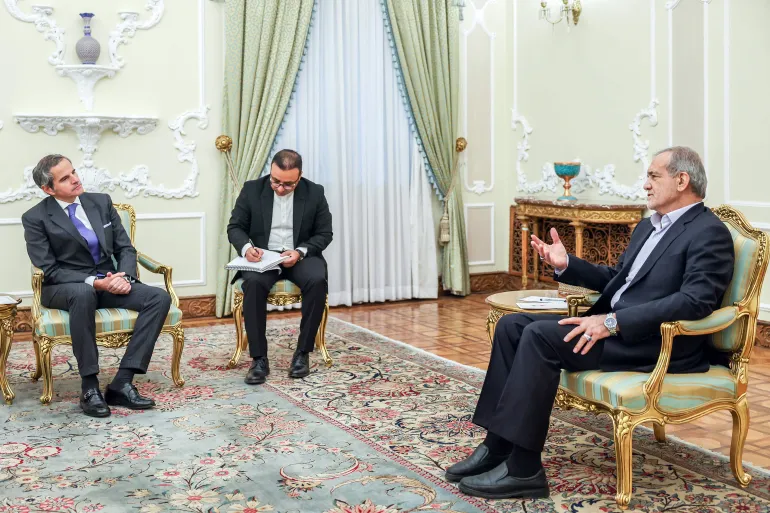In a renewed bid to dispel international concerns surrounding its nuclear ambitions, Iranian President Masoud Pezeshkian met with Rafael Grossi, head of the International Atomic Energy Agency (IAEA), this week in Tehran. President Pezeshkian assured Grossi that Iran remains committed to the peaceful objectives of its nuclear program and expressed readiness to cooperate further with the IAEA to resolve longstanding ambiguities.
“As we have repeatedly demonstrated our goodwill, we announce our readiness to cooperate and converge with this international organization to resolve any alleged ambiguities about our peaceful nuclear activities,” Pezeshkian stated, adding that Tehran is willing to discuss its program in good faith as long as these discussions respect Iran’s sovereignty and rights.
Grossi’s visit comes at a delicate moment for the Middle East, amid heightened regional instability and Western concerns about Iran’s nuclear capabilities. Israeli Defense Minister Israel Katz recently warned that Iran’s nuclear facilities are more exposed than ever to potential strikes, framing this as an “opportunity” to curtail Tehran’s nuclear program. In response, Grossi emphasized that “Iranian nuclear installations should not be attacked,” underscoring the IAEA’s role as a diplomatic bridge to avoid potential escalation.
Iranian Foreign Minister Abbas Araghchi, who previously negotiated Iran’s 2015 nuclear deal with world powers, echoed Pezeshkian’s sentiments, asserting that “Iran has never left the negotiation table on its peaceful nuclear program.” In a social media post, Araghchi reiterated that Tehran is “willing to negotiate based on our national interest and inalienable rights, but not ready to negotiate under pressure and intimidation.” He added that the EU, UK, Germany, and France (the E3) now bear the responsibility to facilitate diplomatic progress.
Iran’s Atomic Energy Organization chief, Mohammad Eslami, affirmed Iran’s willingness to pursue “mutually constructive and effective talks” but warned against any IAEA resolutions that would infringe upon the nation’s nuclear autonomy, suggesting that countermeasures would be swift in such cases. For Grossi, the importance of achieving “concrete, tangible, and visible results” during these talks cannot be overstated as regional stability hangs in the balance.
The timing of Grossi’s visit is critical as the world anticipates the inauguration of U.S. President-elect Donald Trump, whose previous administration’s “maximum pressure” policy intensified hostilities with Iran. Analysts are closely watching Grossi’s diplomatic efforts to determine how Tehran might approach the anticipated renewal of stringent U.S. sanctions, should Trump’s administration reassert its hardline stance on Iran.
While Grossi has urged Iran to increase transparency around its enrichment sites, reports indicate little progress, with Iran alleging that the IAEA is acting under external influence, particularly from Israel. Tehran has also restricted certain IAEA inspector accreditations, further complicating the process.
Iran is currently enriching uranium to 60 percent purity, approaching the threshold for weapons-grade enrichment, though Tehran insists this is for civilian purposes alone. While Grossi has confirmed that Iran does not possess a nuclear weapon, he noted that the country’s stockpile of enriched uranium could theoretically be repurposed for military use if further enriched.
Al Jazeera’s Resul Serdar, reporting from Tehran, noted that Grossi’s visit marks an essential, though challenging, moment in global diplomacy. “There are major sticking points between the two parties, and mistrust remains high,” Serdar said, describing any immediate resolution as unlikely.
As Grossi’s mission unfolds, the nuclear landscape of the Middle East remains volatile, with Iran striving to balance its national interests against rising international scrutiny. For the broader region, the future of Iran’s nuclear program will continue to be a flashpoint as diplomatic and military powers alike weigh in on the high-stakes negotiations ahead.
Nuclear Africa will continue to follow this developing story, as the unfolding dialogue between the IAEA and Iran could set a significant precedent for nuclear transparency and peace in one of the world’s most turbulent regions.
